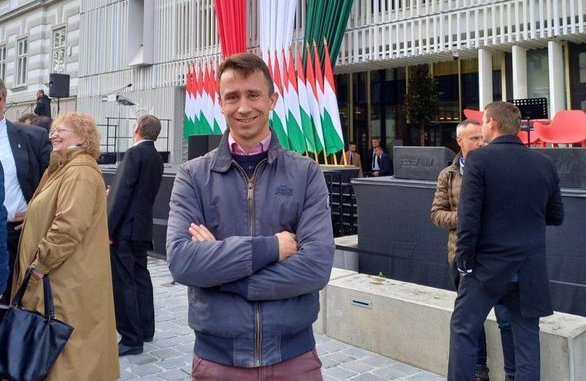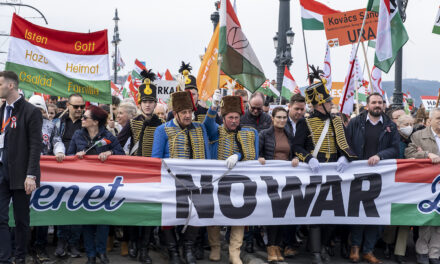"In the twentieth century, there were many people who suddenly found themselves in the middle of the turmoil, even though they did nothing but stand up for their principles, their faith, their convictions, their fellow human beings or even their nation. They didn't intend to write history, but the situation required them to act," French political analyst Thibaud Gibelin examines Viktor Orbán's way of thinking and actions from this perspective. The author gave an interview to Kossuth Rádió's Sunday newspaper program.
We last talked a year and a half ago , when his book was published in French, and a few days ago in Hungarian. If the title of a new book says Viktor Orbán, is it easier or harder to find a publisher?
– If Orbán's name is in the title, it's a good letter of recommendation. The question for publishers is, from what point of view do I want to deal with Central Europe, from what point of view do I want to write about Orbán. The fact is that French publishers don't like people who share. As soon as it spreads about someone, suspicion starts immediately. I had to dispel this in connection with the manuscript. Others have written about the Hungarian regime change and modern Hungarian political life, my goal was to balance the events and give a historical vision to the political decisions. This eventually pleased Faures and L'Harmattan, and they published the book.
And what were the reactions? He said a year and a half ago that the feedback was mostly good. What happened since then?
"At the time, everyone was talking about the coronavirus." Almost all countries responded to the challenges in the same way, although there were differences in the details. For example, there were Central European countries that obtained vaccines not only from the West, but also from, for example, China or Russia. At that time, it was not easy to distinguish, for example, the Hungarian or Eastern European road from the Western one. In February 2022, a new era began with the Ukrainian-Russian war. Hungary was clearly on the side of peace, refusing to serve Western military interests in a period in which Europe was clearly only losing. Now everyone is paying attention to Hungary again and more and more observers are asking why Hungary is following a unique path different from European countries. Of course you can ask why. The answer is multi-layered. On the one hand, it contains the unique Hungarian character in this Slavic sea that surrounds it. Poles with a mindset similar to Hungarians now react differently. On the one hand, due to their geopolitical location, which contrasts them with the Russians, and secondly, because they want to occupy a larger space in Europe, and the Americans are now specifically encouraging and supporting them in this. The Czech public is more against the sanctions and does not want the conflict to escalate further. Hungary is probably moving ahead instinctively because the ruling party has a strong majority, which dares to state the facts that others, Slovaks or Czechs, are less able to do in the absence of a government majority.
He says that French publishers don't like people who share. Is Orbán not like that for you?
"It's not about that at all." Rather, it is about the fact that if the left and liberal sides call someone divisive, they immediately stigmatize that person. Thus, for political reasons, Orbán was immediately locked in a box. The separate path hurts their interests: as soon as someone appears on the conservative side, they immediately try to tie him up because he does not follow the demands of the left and liberals.
The title of his book: Viktor Orbán plays and wins - does this also apply to the fact that politics is actually a serious game?
- The two verbs have a role together. They have the goal and the means.
I gave this title because I wanted to emphasize that the same political will has prevailed in Hungary for several years.
Of course, I had my doubts, since in 2020, when I wrote the book, the left-wing bloc won in some places in Budapest and in the countryside during the local elections in 2019. Then 2022 showed that this policy has continuity and conservative forces continue to govern.
But then does this also mean that he does not always win, Orbán can also lose on certain issues?
– Of course, but this is the inherent uncertainty of democracy. Just look at the serious crisis the EU is in. There have not been such periods since 1945. It is impossible to predict someone's sure victory. Even the most intelligent solutions can fail.
After the virus, the issue of war or peace, what will be the next big topic that can divide politicians?
"Unfortunately, the world has reached a point of destabilization." The dogmas and rules laid down in 1945 no longer apply, the reorganization has begun.
In this world, Europe is very fragile. Now we really see that the continent has been a protectorate for 70-80 years. During the Cold War, we were either Moscow's or Washington's colonies, after 1989 a change took place, but now we really notice that not everyone obeys America anymore.
We saw that a few days ago, Saudi Arabia said no to increasing oil production. This could not have happened before. But not only the Saudis, but other members of OPEC have done the same, that is, they do not obey America. Moreover, these Arab countries do not even sanction Russia in the way that the Europeans do. The question is how Europe can protect its own interests in this situation. We do not yet know how it will behave, as there is still no unity on the most important issues.
To put it even more simply: Will Europe be free or a colony of America? Or am I being too divisive with this question?
- No, you're right, and besides, Europe hasn't been in such a situation in a long time that it can't take responsibility for itself. Moreover, even now, the European elite did not understand that national interests should be protected. They believe that globalization will protect them from everything. This kind of conformism can no longer solve anything, national and European answers to the questions will be needed. This recognition is only typical of Hungarians, it is not yet observed in other European countries.
Why did you choose Orbán, why not say Macron, Trump or Netanyahu?
- It is true that it is fashionable to always deal with American presidents, for example. But for me, Bolsanaro, Trump or Netanyahu do not belong to Europe. Trump was president only once, Bolsanaro just lost, and Netanyahu is president in Israel. I am interested in Orbán because he is European and the leader of one of the countries of the European Union. Moreover, he works in a country that protects its national interests. Secondly, I am interested in Hungary because it is part of Central Europe, and this region was not able to be culturally conquered by America as it did with Western Europe. Cultural richness can be observed in the Visegrád countries and they rely heavily on the historical past, which is no longer characteristic of the West after 1945. Hungary lost a lot in the 20th century, but it is just now showing how it can reposition itself. In this sense, Hungary is much more exciting than America, Brazil or Israel.
Thanks to your book, the French now understand better what is happening here, and can the Hungarian opposition understand this if they read your book?
"It's not fashionable to read these days." Reading requires effort, much harder than tapping on a smartphone. Still, I hope that the book reaches many people, especially because time has already proven many things that Orbán started. As for the Hungarian opposition, they should read this book because it was written by a Westerner, notably a Frenchman, and it might be interesting for them to come out of their own ivory tower, since they always say the same thing. Maybe if they understand a Frenchman's writing, they will think differently. It would be good if they looked at their own country in unity and realized how important it is that Hungary looks at its national interests in cases, even if these are conflict situations.
Do you think V4 cooperation will be stronger after the war or fatally weakened?
– I am sure that the alliance of the four countries is a very important alliance. It is true that Poland and Hungary, for example, are following a different path in connection with the Ukrainian war, but this does not have a significant impact on the future. I say this because in both countries there is a very marked majority that sees the world in the same way and therefore the Visegrád countries cannot afford to be divided.
Source: hirado.hu
Photo: Thibaud Gibelin Twitter













